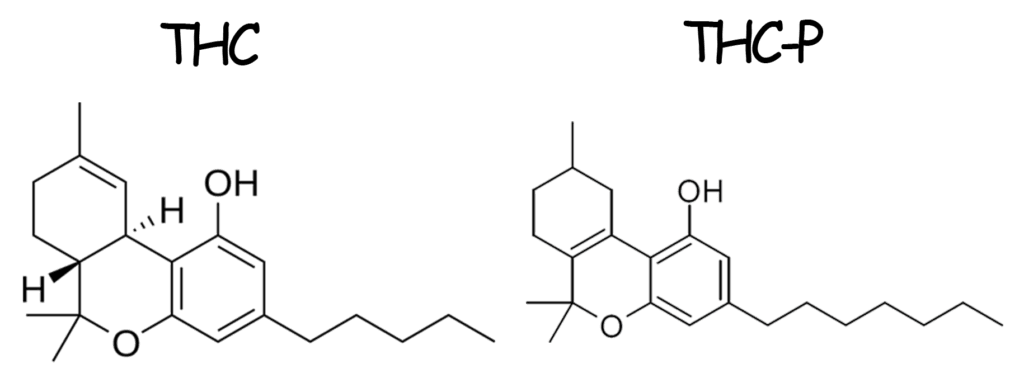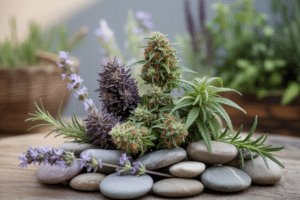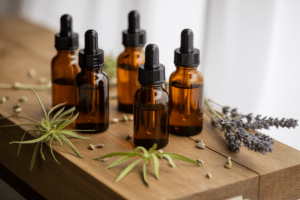- Complete guide to potency, effects & safety of this ultra-strong compound
What is THCP? Unlocking the Power of the Strongest Cannabinoid

Contents
Contents
Introduction to THCP
What if there was a cannabinoid 33 times more potent than THC? Enter THCP (Tetrahydrocannabiphorol), a recently discovered compound from the cannabis plant that is turning heads in the scientific community. Unearthed by Italian researchers in 2019, THCP shares a similar structure with THC but boasts a longer alkyl side chain. This unique structural feature allows it to bind more effectively to the CB1 receptors in our endocannabinoid system, potentially making it significantly more potent than THC.
Let’s explore the groundbreaking potential of THCP and its implications for the cannabis industry.
The Discovery of THCP: A Breakthrough in Cannabis Research
In 2019, Italian scientists made a groundbreaking discovery: THCP (Tetrahydrocannabiphorol), a cannabinoid that could be significantly more potent than THC. Through advanced mass spectrometry and liquid chromatography, researchers identified THCP’s unique seven-carbon alkyl side chain, a structure that allows it to interact more effectively with the body’s cannabinoid receptors compared to THC’s five-carbon chain.
This discovery has opened new avenues for cannabis research, with scientists now investigating how THCP’s distinct molecular composition could lead to stronger therapeutic effects. As we continue to explore the complexities of cannabinoids, THCP stands as a reminder of the cannabis plant’s untapped potential.
THCP’s Chemical Structure: What Makes THCP Unique
Imagine THCP (Tetrahydrocannabiphorol) as THC’s more powerful cousin in the cannabis family. What makes THCP stand out is its unique shape and size at the molecular level.
Key Features of THCP:
- Structural Similarity: THCP closely resembles THC in overall structure, sharing the same core components.
- Extended Alkyl Side Chain: THCP has a longer “tail”—a seven-carbon alkyl chain—compared to THC’s shorter five-carbon chain.
- Enhanced Receptor Interaction: This longer tail allows THCP to interact more strongly with the body’s cannabinoid receptors, particularly the CB1 receptors in the brain.
The Power of THCP:
- Increased Potency: THCP is potentially up to 33 times stronger than THC due to its enhanced binding affinity.
- Intensified Effects: It produces more intense effects on the body’s endocannabinoid system, leading to a stronger psychoactive experience.
- Therapeutic Potential: THCP’s heightened potency opens promising avenues for both recreational users and medical applications, such as pain management and anti-inflammatory therapies.
Here’s a simple visual comparison:

This small difference in molecular structure makes THCP one of the most potent cannabinoids discovered so far. It opens up exciting possibilities for new cannabis products and therapies but also calls for caution due to its strength.
As research continues, THCP’s unique structure could lead to breakthroughs in understanding how cannabinoids interact with our bodies, potentially revolutionizing cannabis-based treatments.
THCP vs. THC: Potency and Effects
Imagine THC as a smooth ride, while THCP feels more like a thrilling roller coaster—both cannabinoids deliver, but THCP’s impact is far more intense. Here’s how they compare:
| Feature | THCP (Tetrahydrocannabiphorol) | THC (Delta-9-tetrahydrocannabinol) |
|---|---|---|
| Potency | Potentially up to 33x stronger | Standard potency |
| Effects | Intense euphoria, deep relaxation | Milder euphoria and relaxation |
| Onset | Faster, immediate | Gradual onset |
| Duration | Longer-lasting | Standard duration |
Why THCP Packs a Punch:
THCP’s potency comes from its unique seven-carbon tail, which allows it to bind more efficiently with CB1 receptors in the brain, like a key perfectly fitting a lock. In contrast, THC’s five-carbon chain offers a looser fit, leading to milder effects.
User Experience:
- THCP: Small doses can deliver profound euphoria, deep physical relaxation, and sensory enhancement.
- THC: Provides a familiar, balanced experience, suitable for both beginners and seasoned cannabis users.
Important Note: Due to its strength, THCP requires more cautious dosing, akin to drinking a shot of espresso versus a regular coffee. This cannabinoid’s potency can easily lead to overwhelming effects for inexperienced users.
As THCP continues to be explored for potential medical and recreational applications, understanding the dramatic difference in potency is crucial for those venturing into this new cannabinoid frontier.
Potential Benefits of THCP: A Promising Cannabinoid
THCP (Tetrahydrocannabiphorol) is emerging as a potent alternative to THC, offering enhanced therapeutic potential in medical cannabis treatments. While research is still in its early stages, the cannabinoid’s unique properties suggest several key benefits:
| Potential Benefit | How THCP Might Help | Comparison to THC |
|---|---|---|
| Pain Relief | Stronger binding to receptors may result in more effective pain management | Likely more potent than THC |
| Inflammation Reduction | May offer more robust anti-inflammatory effects for chronic conditions | Similar to THC, potentially stronger |
| Sleep Improvement | THCP’s sedative effects could lead to deeper, longer sleep | Greater impact on sleep disorders |
| Anxiety Management | Lower doses may help alleviate anxiety without overwhelming effects | Comparable to THC, requires precise dosing |
THCP interacts with the body’s cannabinoid receptors more efficiently than THC, which may allow for smaller, yet more impactful doses. This potency could be particularly beneficial for patients who don’t respond as well to standard THC treatments.
Key Points:
- THCP’s enhanced effects may open new avenues for personalized cannabis-based therapies.
- Smaller doses could be just as effective, reducing potential side effects.
However, given its potency, THCP requires further research to fully understand its therapeutic potential and risks. Always consult a healthcare professional before exploring new cannabinoid treatments.
Safety and Side Effects of THCP: What You Need to Know
THCP (Tetrahydrocannabiphorol) is a high-potency cannabinoid, much stronger than THC. With its increased strength comes a greater likelihood of side effects, making cautious use essential.
Common Side Effects of THCP:
- Anxiety: Higher doses can trigger feelings of anxiety or paranoia: Tip: Start with a very low dose to reduce this risk.
- Dizziness: THCP can cause lightheadedness or loss of balance: Tip: Ensure you’re in a calm, comfortable environment.
- Dry Mouth and Red Eyes: Typical cannabis effects, but potentially more intense: Tip: Keep water and eye drops on hand.
- Impaired Coordination: THCP may affect your ability to perform physical tasks: Tip: Avoid activities like driving after consumption.
Potential Side Effects Spectrum:
Mild Severe
|-----------|-----------|-----------|-----------|
Dry Mouth Red Eyes Dizziness Anxiety Impaired
CoordinationSafety Guidelines for THCP Use:
- Microdose: Start with the smallest possible amount.
- Wait Before Redosing: Allow at least 2 hours before increasing your dose.
- Track Your Usage: Keep a record to find your ideal dose.
Important: Consult a healthcare provider before using THCP, especially if you:
- Are on other medications
- Have a history of mental health issues
- Are pregnant or breastfeeding
Due to its potency, THCP requires careful dosing and awareness of its effects.
THCP Legality: Navigating Cannabis Laws
THCP (Tetrahydrocannabiphorol) exists in a legal grey area across many regions due to its novelty and the rapidly evolving cannabis regulations.
United States:
- Federal Level: THCP is not explicitly regulated under federal law, but it may fall under the 2018 Farm Bill, which allows hemp-derived cannabinoids with less than 0.3% THC.
- State Level: States vary widely in their cannabis regulations. Some may allow THCP under hemp rules, while others could restrict or ban it.
Europe:
- EU Level: THCP is largely unregulated, though it may be restricted under the Novel Food Regulation.
- Country-Specific Laws: Each country has its own stance on cannabinoids, creating a patchwork of rules.
Before purchasing or using THCP, it is critical to verify local laws as this evolving regulatory landscape continues to change.
THCP Consumption Methods and Products: A Comprehensive Guide
As THCP (Tetrahydrocannabiphorol) becomes more available, several consumption methods offer varying effects, onset times, and durations. Here’s a breakdown of the most common ways to consume THCP:
| Method | Description | Onset Time | Duration | Best For |
|---|---|---|---|---|
| Vape Cartridges | Inhaled through vape pens for fast effects | 1-5 minutes | 1-3 hours | Quick relief, immediate effects |
| Edibles | Infused food products, like gummies | 30-90 minutes | 4-8 hours | Long-lasting, discreet use |
| Tinctures | Liquid extracts taken under the tongue | 15-45 minutes | 2-4 hours | Precise dosing, moderate duration |
| Concentrates | Potent extracts for experienced users | 1-5 minutes | 1-3 hours | Intense effects, customizable dose |
Important Considerations:
- Potency: THCP is significantly stronger than THC. Start with a much smaller dose.
- Onset Time: Vaping is quick-acting, while edibles provide delayed but longer effects.
- Duration: Consider how long you want the effects. Edibles last longer; vaping is more immediate.
- Body Response: Factors like tolerance and body chemistry influence THCP’s impact.
- Quality Assurance: Only purchase from trusted sources offering third-party lab testing.
Safety First: Begin with low doses due to THCP’s potency. Consult a healthcare professional, especially if you have pre-existing conditions or take medications.
New products and methods for consuming THCP are emerging, so stay updated and prioritize safe use.
The Future of THCP in the Cannabis Industry: Innovations and Challenges
THCP (Tetrahydrocannabiphorol) is set to transform the cannabis landscape with its unmatched potency and unique properties. The future of THCP offers exciting opportunities, from innovative products to advanced medical applications.
Product Innovation: Ultra-low dose and extended-release THCP formulations could reshape consumer experiences, creating new niches in the market.
Medical Potential: THCP may open doors for more effective, personalized treatments for pain management and neurological conditions.
Regulatory Focus: As THCP grows in popularity, regulators will need to address safety standards and proper dosing guidelines to ensure responsible use.
Its potential is vast, but careful oversight will be essential for unlocking THCP’s full promise.
Frequently Asked Questions About THCP
| Question | Quick Answer | Detailed Explanation |
|---|---|---|
| What is THCP? | A potent cannabinoid | THCP (Tetrahydrocannabiphorol) is a recently discovered cannabinoid with a structure similar to THC but with a longer seven-carbon side chain. This unique structure allows it to interact more strongly with the body’s cannabinoid receptors. |
| How does THCP compare to THC? | Much stronger | THCP is estimated to be up to 33 times more potent than THC. Its increased binding affinity to CB1 receptors in the brain leads to more intense psychoactive effects. |
| What are THCP’s effects? | Similar to THC, but stronger | THCP produces effects like euphoria, relaxation, and potential sedation, similar to THC but much more intense. Even small doses can lead to powerful effects and a higher risk of side effects such as anxiety or dizziness. |
| Is THCP legal? | It’s complicated | THCP exists in a legal grey area. Its status depends on local laws and may fall under broader cannabinoid regulations. Always check your local regulations before purchasing or using THCP products. |
| Where can I find THCP products? | Select cannabis markets | THCP products (vapes, edibles, tinctures) are available in some cannabis markets but are less common than THC or CBD products. Verify legality and purchase only from reputable sources. |
| How should I dose THCP? | Start very low | Due to its high potency, start with a much lower dose than you would with THC. Begin with the smallest possible amount and wait for effects before considering more. |
| Are there medical uses for THCP? | Research is ongoing | While THCP shows potential for medical applications due to its potency, research is still in early stages. Possible areas of study include pain management and neurological disorders. |
| What are the risks of using THCP? | Increased side effects | The high potency of THCP increases the risk of side effects like anxiety, dizziness, and impaired coordination. It may also have a higher risk of overconsumption due to its strength. |
Key Takeaways:
- THCP is a highly potent cannabinoid, much stronger than THC.
- Its legal status is often unclear and varies by location.
- Due to its strength, careful dosing and caution are crucial when using THCP.
- More research is needed to fully understand THCP’s effects and potential uses.
Important Note: Always consult with a healthcare professional before trying THCP or any new cannabinoid product.
Conclusion: THCP – A New Frontier in Cannabis Research
The discovery of THCP (Tetrahydrocannabiphorol) marks a significant milestone in cannabis science, opening up new avenues for research, product development, and potential medical applications. As we conclude our exploration of this potent cannabinoid, let’s recap the key points and look towards the future:
THCP: A Game-Changer in Cannabis
Unprecedented Potency:
- Up to 33 times stronger than traditional THC
- Offers intense psychoactive effects at lower doses
Unique Chemical Structure:
- Seven-carbon side chain enhances binding to cannabinoid receptors
- May lead to novel therapeutic applications
Potential Medical Benefits:
- Pain management
- Neurological disorders
- Other areas yet to be explored through research
Challenges and Considerations:
- Legal status remains complex and varies by region
- Careful dosing is crucial due to high potency
- More research needed to fully understand long-term effects
The Road Ahead for THCP
- Research Opportunities: THCP’s discovery highlights that there’s still much to learn about the cannabis plant. Ongoing studies may uncover new cannabinoids and therapeutic possibilities.
- Industry Impact: As knowledge about THCP grows, it could reshape product development in the cannabis industry, potentially leading to more targeted and effective formulations.
- Regulatory Evolution: The emergence of THCP may prompt regulatory bodies to reassess and update cannabis laws to address new, potent cannabinoids.
- Consumer Education: As THCP products become more available, there will be a growing need for clear, accurate information to ensure safe and responsible use.
Final Thoughts
THCP represents both exciting possibilities and significant responsibilities for the cannabis community. Its potential to enhance our understanding of cannabinoid science and improve therapeutic outcomes is balanced by the need for cautious approach and thorough research.
As we stand at the frontier of this new cannabinoid discovery, it’s crucial for researchers, industry professionals, policymakers, and consumers to work together. By fostering responsible research, development, and use of THCP, we can unlock its full potential while prioritizing safety and efficacy.
The journey of THCP is just beginning, and it promises to be a fascinating chapter in the ever-evolving story of cannabis science.
Disclaimer: The information provided in this article is for educational purposes only and is not intended as medical or legal advice. THCP is a relatively new and potent cannabinoid, and its effects, benefits, and legal status are still being studied. Always consult a healthcare professional before using any cannabis products, especially if you have underlying medical conditions or are taking other medications. Additionally, ensure compliance with local laws regarding THCP and cannabis products.
Stay Informed! Want to stay updated on the latest developments in cannabis research, product launches, and exclusive insights on cannabinoids like THCP? Sign up for our newsletter! Join our community to receive expert tips, industry news, and special offers directly to your inbox. Don’t miss out—subscribe today!




